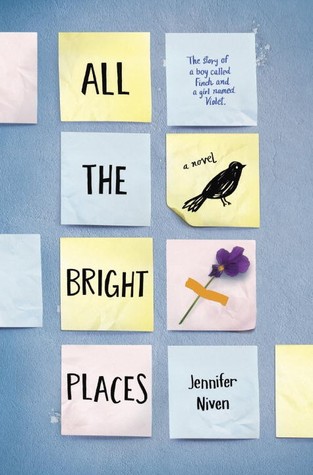Author: Jennifer Niven
Release Date: January 6th, 2015
 Pages: 388
Pages: 388Review By: Max

After her sister died in a tragic accident, Violet Markey attempts to return to her normal life. She soon realizes nothing can ever be the same, so Violet spends her time counting down the days until she can leave her small Indiana town and the haunting grief.
Theodore Finch (or Theodore Freak, as his classmates are known to call him) tries on different versions of himself in order to forget about the bullies and his troubled home life, but it's becoming harder and harder to stay awake.
One fateful school day, the two find themselves on the top of a bell tower, contemplating jumping. Even though the two have never spoken before, they manage to talk each other out of any sort of reckless decision, and despite their popularity differences, Violet and Finch slowly become friends. The friendship quickly becomes something more, and Violet and Finch discover who they are and what life can be when you're not focused on death. As they become more focused on life, however, Finch starts to lose the strength he needs to stay awake.
I would like to begin this review with an essential piece of information: I enjoyed reading The Fault in Our Stars. In fact, it's one of my favorite books of all time--I loved everything about the characters, the humor, and the heartbreak.
However, I didn't love The Fault in Our Stars enough to read it again, by a different author, with a few small changes. Violet and Finch were quirky beyond belief and constantly quoted a famous piece of literature, and the book was chock-full of sentences crafted with the single purpose of making your eyes water. Sounds familiar, does it not?
Where TFiOS deals with cancer, All the Bright Places deals with bi-polar disorder, PTSD, and suicide. That doesn't sound like a bad thing, right? I agree with the author--the YA world definitely needs more discussion on mental illness. Unfortunately, Violet and Finch became their illnesses, and I would have preferred a book that showed the opposite--that people are more than their diagnoses.
I didn't connect with either of the main characters on any level. Their illnesses did not give them depth, and I rarely saw any personality out of either Violet or Finch beyond very pronounced quirkiness. I connected more with Violet than Finch, however. Her grief was more relatable, and the way her mental illness was portrayed made more sense (to me) than the way Niven described Finch's struggle with staying awake.
Romance, especially in a book like All the Bright Places, can be really make or break a book for me. So I continued reading AtBP, even though I wasn't really enjoying it, with the hope that the romance might redeem the book for me.
I was wrong. In fact, the romance was one of my biggest issues of the book.
(If you're sensitive to mild spoilers, it's probably best if you ignore the next couple of paragraphs.)
Maybe this is just a personal thing, but the best relationships to read about are the ones in which the two people involved help each other change for the better. I don't know, maybe I'm being totally naive, and that's not something that happens in the real world. Either way, the opposite happened in All the Bright Places--I don't think Finch was completely good for Violet. Because of him, Violet cut class and ruined her relationship with her parents. These two things might seem kind of small, but they're something I could never in a million years see myself doing, and it prevented me from connecting with the characters. Sure, you could argue that Finch was good for Violet in that he helped her forget about her grief, etc, which is true, but I wish it didn't come at such a cost.
Similarly, I thought the ending proved that Violet never really helped Finch get better. Once again, this might just be a personal thing, but I really really really would have preferred the ending to be a happy one. I don't think I can appreciate the way the book ended, with suicide being portrayed as a big romantic gesture.
It may seem like I completely hated this book, but I just had a lot to say about.
There were some good things about All the Bright Places. Niven's writing style was certainly enjoyable, and the book was definitely quotable, my favorite being "You are all the colors in one, at full brightness."
I found this book too similar to The Fault in Our Stars to be enjoyable, and there was nothing that redeemed it for me. If you're a fan of quirky/cute styles or sad, The Fault in Our Stars-esque romances, you'll probably enjoy All the Bright Places. Otherwise, I'd probably avoid this book.





No comments:
Post a Comment